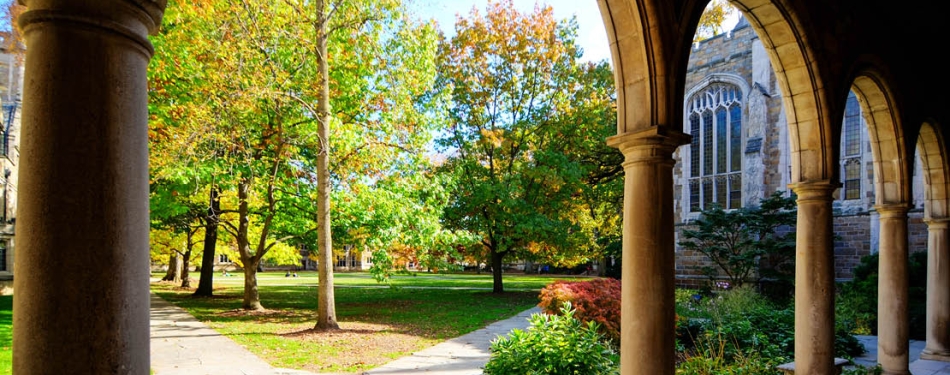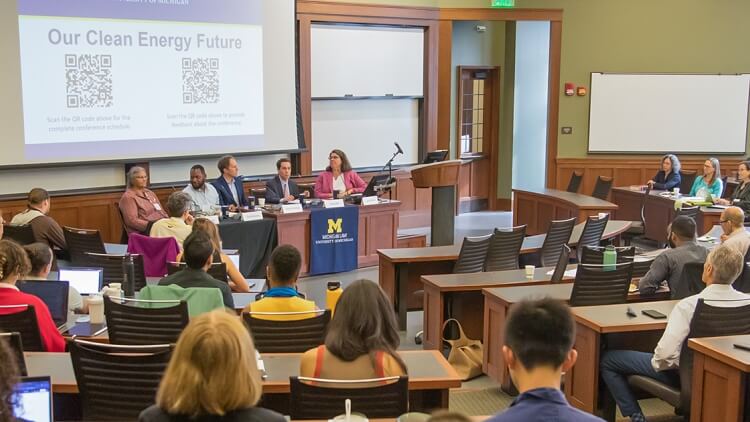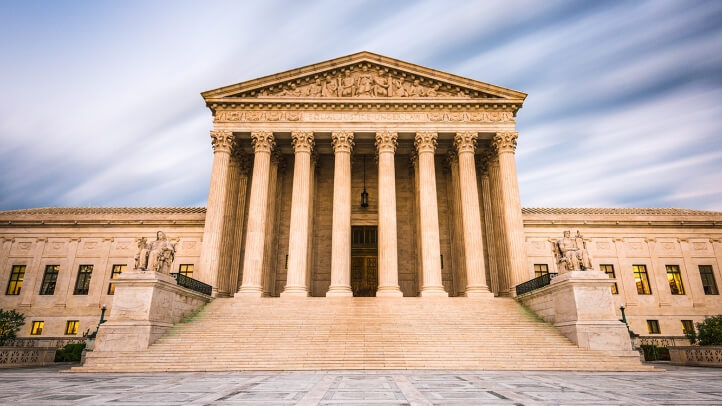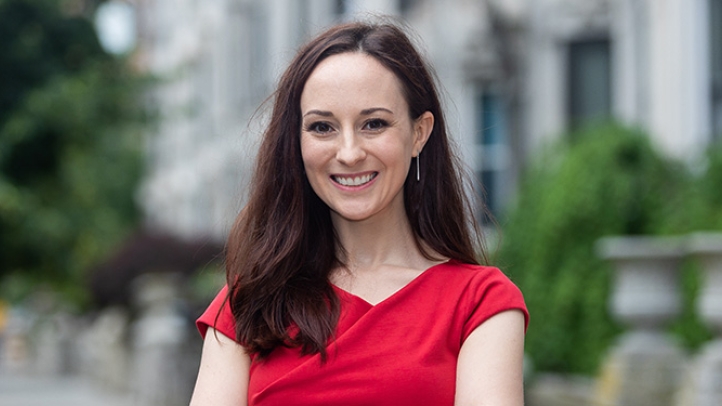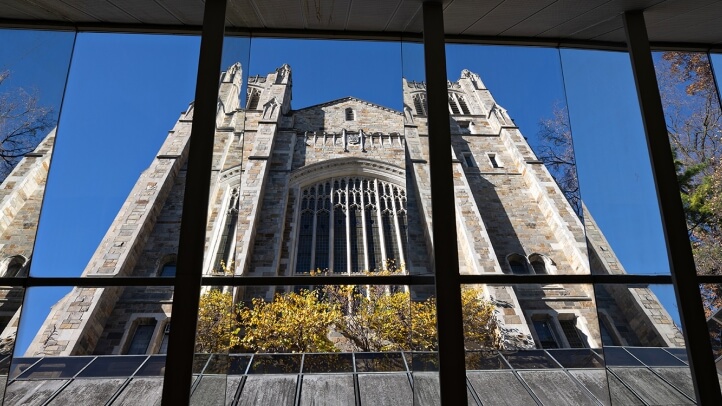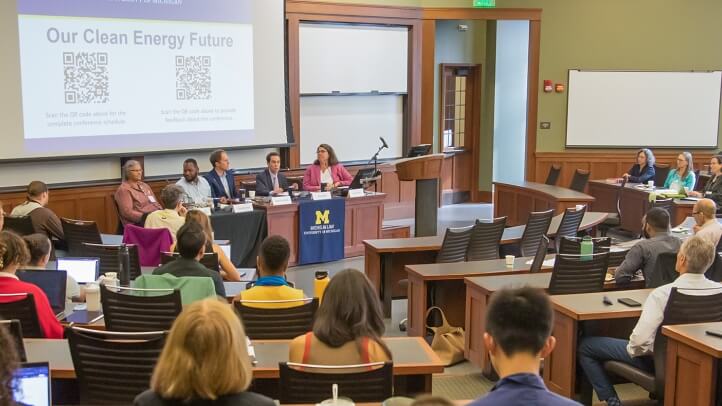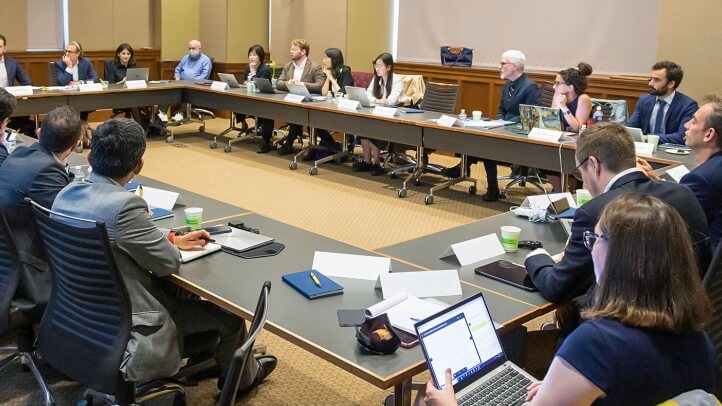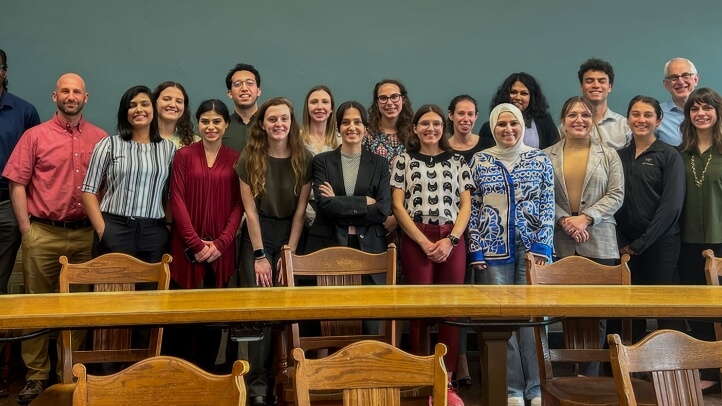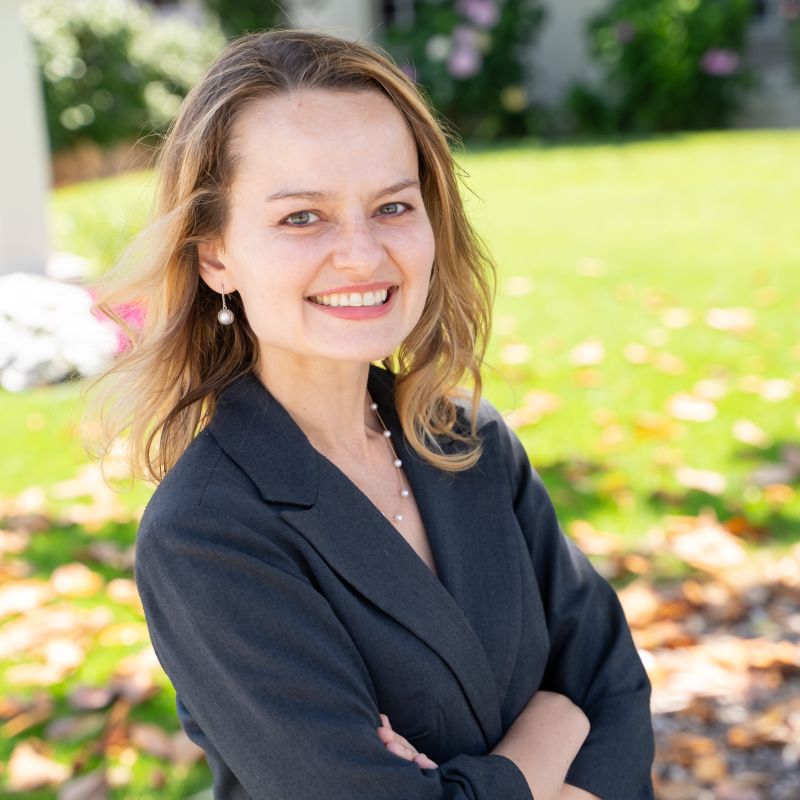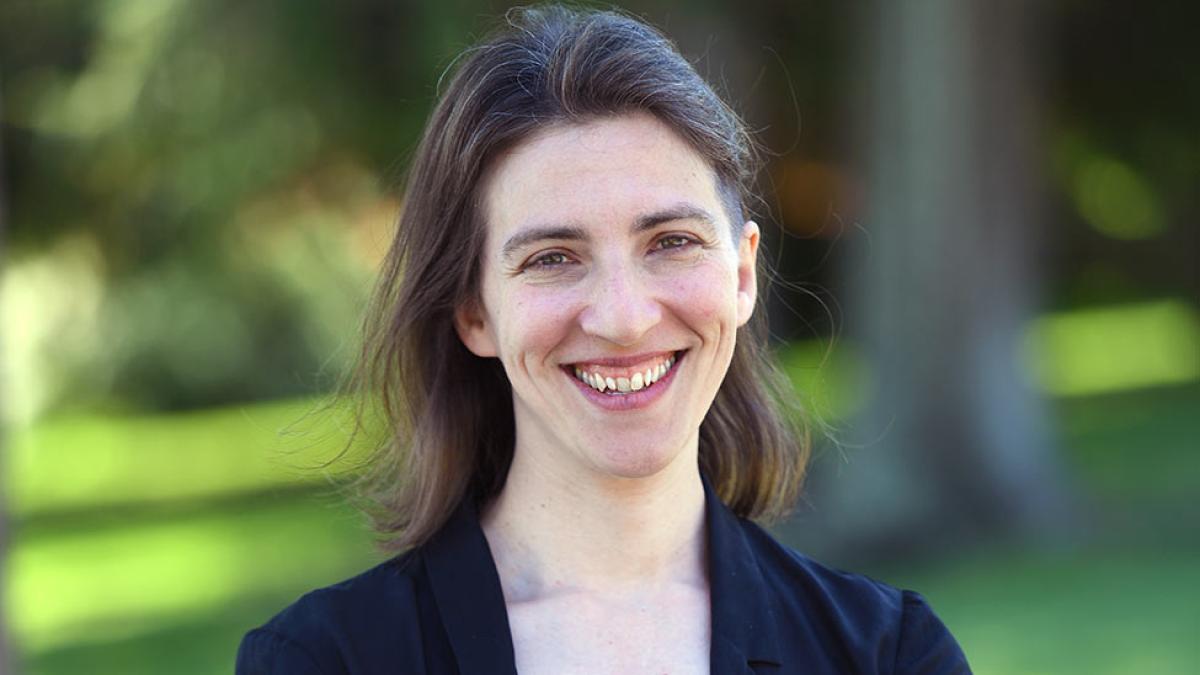About the Environmental and Energy Law Program
The Environmental and Energy Law Program combines the Law School’s long and rich tradition in environmental and natural resources law with an active engagement in contemporary energy law and policy concerns. The program features leading experts in environmental law, energy law, administrative law, climate change, international environmental law, public lands, and natural resources law.
We also build on the University of Michigan’s outstanding interdisciplinary and dual degree programs—unmatched by any other law school—with the School for Environment and Sustainability, the Ford School of Public Policy, the Ross School of Business, the Taubman College of Architecture and Urban Planning, and the School of Public Health.
The program offers one of the most extensive environmental, natural resources, and energy law curricula among top law schools in the United States, as well as a superb environment law clinic in partnership with the National Wildlife Federation.
We sponsor an acclaimed lecture series on environmental and energy issues, which features leading voices from academia, government, environmental groups, and industry, as well as a speaker series focused on careers in environmental and energy law.
Program highlights include a biennial conference every other Fall semester with our student Environmental Law Society, pro bono programs, the student-run Michigan Journal of Environmental and Administrative Law, and student participation in the National Environmental Law Moot Court Competition.
With its superb faculty, rigorous academic program, and unrivaled practical experiences for students, the Environmental and Energy Law Program has established Michigan Law as one of the top programs of its kind in the United States.
EELP Lecture Series
The Environmental and Energy Law Program Lecture Series features speakers from a wide range of backgrounds in government, academia, public interest groups, industry, and private practice.
The lecture series offers Michigan Law students the opportunity to learn from leaders of environmental advocacy, government, and industry, builds relationships between the Law School and the environmental community and contributes to debates over the environmental and energy challenges facing our nation and the world. Students often meet privately with speakers during their visits to Michigan Law.
Some lecturers are co-sponsored by other schools and programs at the University of Michigan. All lectures are open to the public. Admission is free.
-
2024-2025 Academic Year
September 4, 2024
David Spence, University of Texas School of Law
“Climate of Contempt: How to Rescue the U.S. Energy Transition from Voter Partisanship”
October 23, 2024
Sheila Foster, Columbia Climate School
“The State and Local Law Landscape for Climate Justice”
November 20, 2024
Michael Drysdale, Dorsey & Whitney LLP
“The Supreme Court’s Last Term: Why You Should Care about the Four Horsemen of the Administrative Law Apocalypse”
February 5, 2025
Shalanda Baker, Vice Provost for Sustainability and Climate Action, University of Michigan
“Equitable Implementation of Federal Climate Policies and Investments”
February 26, 2025
Riyaz Kanji, Founder and Directing Attorney at Kanji & Katzen
“Pursuing Tribal Environmental Justice in the Line 5 Oil Pipeline Dispute”
March 17, 2025
Patrice Simms, Vice President for Health Communities at Earthjustice
“What Does the Future Hold for Title VI and Environmental Justice?”
March 21, 2025
Debbie Chizewer, Managing Attorney at Earthjustice
Alexandra Klass, James G. Degnan Professor of Law and Co-director of the Environmental and Energy Law Program
Jonathan Martel, Partner and Co-chair of the Environmental Practice Group at Arnold & Porter
“Trump 2.0: Environment and Energy Policy Developments”
April 9, 2025
Alyssa Johl, Vice President and General Counsel at the Center for Climate Integrity
Naomi Spoelman, Staff Attorney at the Center for Climate Integrity
“Past, Present, and Future of Climate Accountability: Finding Liability for Big Oil’s Climate Deception”
-
2023-2024 Academic Year
April 8, 2024
- Kirti Datla, Director of Strategic Legal Advocacy, Earthjustice
- “Environmental Litigation, the Supreme Court’s New Statutory Interpretation Rules, and the Chevron Doctrine”
March 6, 2024
- Kate Konschnik, Principal Deputy Assistant Attorney General, Environment and Natural Resources Division, US Department of Justice
- “The Role of Enforcement in Tackling Climate Change and Advancing Environmental Justice”
February 14, 2024
- Lisa Benjamin, Lewis & Clark Law School
- “The SEC and Climate Disclosure”
January 22, 2024
- Gabriel Chan, University of Minnesota
- “Energy Justice in State Utility Regulation”
November 1, 2023
- Narayan Subramanian, US Department of Energy
- “An Agency Forged from Crises: The Department of Energy and its Role in Addressing the Climate Crisis Today”
October 11, 2023
- Heather Tanana, UCI Law
- “Securing Tribal Water Rights after Arizona v. Navajo Nation”
September 19, 2023
- Ricky Revesz, New York University School of Law
- “Modernizing Regulatory Review”
Dual Degrees and Pro Bono Projects
Michigan Law offers a range of outstanding dual degree programs, including one of the only Law and Natural Resources (JD/MS) programs in the country. Michigan also offers superb Law and Public Policy (JD/MPP), Law and Business Administration (JD/MBA), and Law and Public Health (JD/MHSA or MPH) programs.
In addition to its extensive course offerings, clinical work, and lectures and conferences, the Environmental Law and Policy Program offers students the opportunity to gain practical experience working on pro bono projects that are part of the Law School’s pro bono pledge. These opportunities, which are available to first-year students as well as 2Ls and 3Ls, allow students to work closely with faculty and other students on cutting-edge issues that promote environmental protection and sustainability efforts.
-
Dual Degrees and Interdisciplinary Opportunities
Environmental law brings together multiple disciplines in ways that exceed most other curricular and practice areas.
Environmental attorneys are litigators, regulators, compliance officers, treaty negotiators, and policymakers; their work depends upon expertise in ecology, biology, chemistry, engineering, risk science, toxicology, public health, and resource management.
To be successful, environmental attorneys must have the ability to work with people across disciplines and to translate complex scientific concepts into accessible language. At Michigan, that process starts with an interdisciplinary emphasis along with joint degree programs that no other top law school can match.
Michigan Law offers a range of outstanding dual degree programs, including one of the only Law and Natural Resources (JD/MS) programs in the country. Michigan also offers superb Law and Public Policy (JD/MPP), Law and Business Administration (JD/MBA), and Law and Public Health (JD/MHSA or MPH) programs.
Students seeking dual degrees may apply to the programs that interest them during their first or second year of law studies. Ad hoc dual degree programs can also be designed to fit the more narrowly tailored needs of individual students who wish to pursue careers in environmental and natural resources law.
In addition to dual degrees, Michigan Law offers a wide range of interdisciplinary opportunities for students interested in environmental law. Students can take environmental courses at other schools on campus, including the School for the Environment and Sustainability, the Ford School of Public Policy, the Ross School of Business, the Taubman College of Architecture and Urban Planning, and the School of Public Health.
Each year, Michigan Law students are eligible to apply for the Dow Sustainability Fellows Program, which awards $25,000 grants to students to work on interdisciplinary projects with students from other graduate and professional schools on campus, a program no other law school offers.
Students also have the opportunity to participate in a wide range of interdisciplinary programs sponsored by the Graham Sustainability Institute, the Erb Institute for Global Sustainable Enterprise, the Center for Sustainable Systems, and the Institute for Energy Solutions. Few universities can offer its students more opportunities to explore different aspects of environmental issues than the University of Michigan.
-
Pro Bono Projects
The Environmental Crimes Project
Nearly 400 Michigan Law students collaborated beginning in Fall 2010 on the first comprehensive empirical study of environmental criminal prosecutions in the United States. The students obtained and reviewed court documents from nearly 2,000 cases prosecuted from January 1, 2005, through December 31, 2018, and created a searchable database about all pollution prosecutions investigated by the EPA during that time frame.
The database facilitates research and analysis about criminal enforcement, including the charges that are most frequently brought, the size of the corporations involved, case outcomes, discretionary factors that make environmental violations criminal, and geographical disparities in criminal enforcement under the environmental laws. Research results have been published by the Harvard Environmental Law Review, the Michigan Journal of Environmental and Administrative Law, the American Bar Association, and the Environmental Law Institute and have been featured in the New York Times.
The Green Gavels Project
Every year, the Michigan Supreme Court makes decisions that have a critical impact on environmental protection and natural resources use. The Court’s role is likely to increase in future years as the state grapples with issues pertaining to water rights, water contamination, sulfide mining, land use, and air quality.
The Green Gavels Project began in 2012 with a review of Michigan Supreme Court decisions over the last two decades to identify all decisions that have promoted or hindered environmental protection.
Students working on the project analyze each decision and produce summaries that explain the significance of the decision and how each Supreme Court justice voted. The information is then provided to the Michigan League of Conservation Voters, which produces a non-partisan online report about the role of the Court and the voting records of individual justices that is broadly available to the public on a website that is heavily marketed, easily discovered, and seamlessly navigated.
The project is a model for efforts to assess how elected state Supreme Courts are influencing conservation efforts throughout the United States.
Public Utility Regulation Initiative (PURI)
In the short term, PURI’s goal is to assist the Citizens Utility Board of Michigan (CUB of MI) and attorneys representing it at the Michigan Public Service Commission with legal research and other behind-the-scenes tasks that will enable them to make a stronger showing in rate cases, which directly determine how much Michiganders pay for utilities.
Examples of this research include cross-state energy policy comparisons, analyses of whether the utility companies’ revenue requirements are “reasonable,” and examinations of the energy burden Michiganders currently face.

